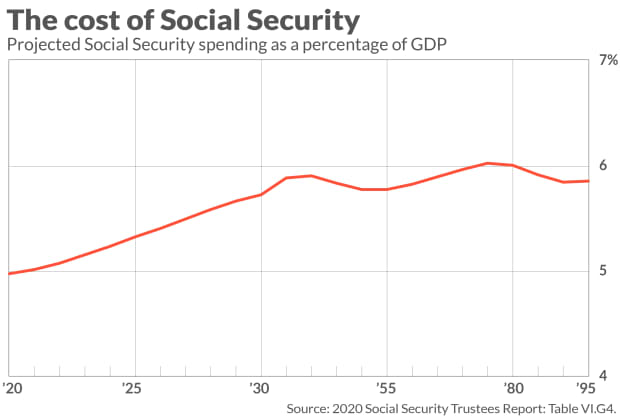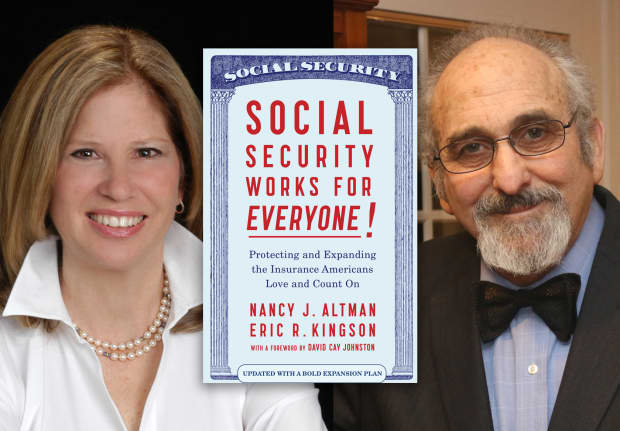This post was originally published on this site
It is well past time to expand Social Security. When President Franklin Roosevelt signed Social Security into law on Aug. 14, 1935, he described his landmark legislation as “a cornerstone in a structure which is being built but is by no means complete.”
On that cornerstone of old age pensions, subsequent policymakers increased the level of benefits and added new protections, such as for those who experience long-term disability that prevents them from supporting themselves through work. Yet no expansions have been enacted for almost half a century.
Standing in the way is the erroneous claim that the United States, the wealthiest country in the world at the wealthiest moment in its history, cannot afford our Social Security system. All of us hear variations of this myth – that Social Security is unaffordable, that it is going broke, that it is placing a huge future burden on our grandchildren, that it must be cut or radically changed. We hear those claims over and over, when talking with family and friends, listening to CNN and Fox News or reading about the future of Social Security.
These ubiquitous claims didn’t just happen spontaneously. Rather, a billionaire-funded campaign has worked hard since the last expansion to convince media, politicians, other elites and everyday Americans that today’s Social Security must be cut.
Even with the Census Bureau estimating that the number of persons 65 and older will grow from roughly 56 million today to 73 million in 2030 and 95 million in 2060, the reality is that Social Security, as a percentage of the nation’s gross domestic product, will not cost much more at the end of the 21st century than it costs today. And notably, the percentage that the United States will be spending on Social Security at the turn of the century is considerably less than most industrialized countries spend on comparable programs.

Not only is expansion affordable, it is essential. Social Security benefits are modest, with monthly benefits averaging just $1,548 for retired workers – that’s $18,576 a year — and $1,279 for adults with disabilities, or $15,348 a year.
Even before COVID-19, the nation was careening toward a retirement income crisis, with estimates revealing that half of today’s workforce will be unable to maintain their standard of living in retirement; roughly two-thirds when personal healthcare and long-term-care expenditures are counted.
Women are particularly vulnerable to falling into poverty in old age. Their promotion opportunities are fewer and wages lower – about 82 cents on the dollar – compared to men. They often step out of the workforce to care for young children and for family members with severe disabilities or illnesses. The pandemic and resulting economic shocks have only exacerbated these problems.
“
Whether to expand or cut Social Security is a question of values, not economics, demographics or mathematics.
”
We propose an All Generations Plan that increases benefits by around 50%, adds paid family leave, paid sick leave, credit for caregiving, and more. And it pays for every penny, ensuring that all current and new benefits can be paid for the next three-quarters of a century and beyond.
The plan requires everyone (and their employers) to make slightly larger Social Security contributions, phased in over 30 years, and requires the wealthiest, who have benefited so much, to pay substantially more. The plan, for example, restores the federal estate tax, repeals the favorable tax treatment enjoyed by the fossil fuel industry, and taxes stock-market speculation, with the proceeds dedicated to Social Security.
It also eliminates the cap on earnings subject to Social Security contributions, gradually, over 10 years, so CEOs pay the same rate as minimum-wage workers.

New Press
Whether to expand or cut Social Security is a question of values, not economics, demographics or mathematics.
Expanding Social Security is about the kind of nation we want to live in and leave for those who follow. Fortunately, poll after poll reveals that, despite how polarized we are over many issues, we are not polarized about Social Security. Overwhelming majorities of Republicans, Democrats, and Independents do not want to see Social Security cut. We want it expanded.
Those we elect — who work for us, after all – should follow the will of the American people and expand Social Security.
Nancy J. Altman, a lawyer, is president of Social Security Works. Eric Kingson is a professor at Syracuse University’s School of Social Work and chairs the board of Social Security Works. They are the authors of “Social Security Works for Everyone! Protecting and Expanding the Insurance Americans Love and Count On.”
Now read: Fears of a retirement crisis are overblown — and these numbers prove it

